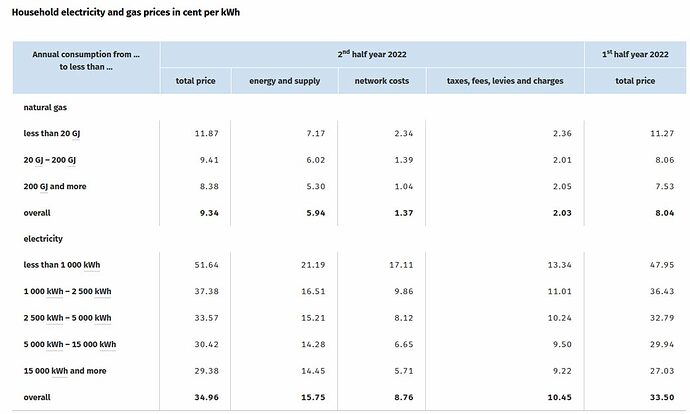Their man in parliament has proposed this for new installations as opposed to boilers. I presume these are gas or oil fired.
Does anyone have the cost comparison figures for Europe??
electrical - so can use RE sources if they are available
Can’t help on costs, sow. These things are more efficient for sure. Even without any green agenda, this makes sense, bar of course any cost delta to boilers.
WarmGroetnis
Ireland is pushing heat pumps at a system level as well.
Or a little 60kw setup: Giant Heat Pump Takes Over Entire Danish Town
Heatpump manufacturers have gone a long way in producing heatpumps that will produce their rated capacity even in very cold conditions, that’s been something keeping people in some climates from adapting.
I also see more and more aircons / heatpumps using R32 refrigerant.
Which is a definite step up on R410
Please elaborate…
I wish I could. It was part of a long day’s presentations, that, quite frankly, was “death by PowerPoint”.
I was critical, saved by a triage error at that point.
Edit: Something along the lines of a pilot project for a small town in the South -West.
System level: I think refers to large scale (town/village) level interventions.
So non-residential. The Denmark example above would be system level.
For Germany
from Reuters
The SPD also sought changes to ensure that replacing heating systems wouldn’t overburden low-income households.
Under the agreement, a rule on switching heating systems in old buildings to ones that run with 65% renewable energy from 2024 will initially only apply if there is a municipal plan for the heating supply in the area, according to the agreement document seen by Reuters.
Germany aims to have a country-wide municipal heating plan by 2028 at the latest.
This would give homeowners time to decide whether to switch to a heat pump, connect their homes to district heating or install a gas heater that can be converted to run on hydrogen.
Gas heaters may still be installed starting from next year if they can be converted to hydrogen, including in new buildings if they are not part of new development zones.In new development areas, heating systems installed still have to run on 65% renewable energy
And just to show that political point scoring and media bunfights calling into question party competence are not unique to the Southern tip of Africa:
German eco-party ridiculed over failure to install HQ’s €5m heat pump
Project at Greens’ headquarters has taken over three years because of drilling permit delays and difficulties finding qualified tradesmen
That chart doesn’t make a lot of sense…
I mean if I take a look at H2 the average price per MWh for natural gas was about 140 EUR. (With Aug and Sep prices into the stratosphere)
That gives a price per kWh of 14 cents, regardless on the volume purchased (I would imagine that would be the price for the 200GJ+ clients)
Hidden subsidies perhaps?
possibly.
another source claims:
The average gas price for household customers in February 2023 was 18.15 cents per kilowatt hour (ct/kWh) in a single-family house and 17.72 ct/kWh in a multi-family house. The average prices for a kilowatt hour of gas in the fourth quarter of 2022 were 20.04 and 19.81 ct/kWh respectively.
I suspect the table (from the German equivalent of Stats SA) probably includes the effect of “a 200-billion euro ‘defence shield’ in September, which includes subsidies for reducing gas and electricity prices”.
see under “the double target” heading.
Maybe a bit late, but:
I am living in Germany and my real prices for gas are quite different from what these statistics say.
Before the Ukraine war I (and a lot of other people living in one and two family homes I know) paid 3.7ct/kWh (some up to 5ct). After the start of the war, my provider presented a sudden increase to 27ct. So I cancelled that contract and ‘fell back’ to what is called the ‘basic consumer tarif’ (which normally is much higher than the individual tarifs) of around 10ct/kWh. Last week I made a new individual contract for 8.4ct/kWh. This is for a yearly supply of around 30000kWhs.
So these statistic figures shown seem a bit strange to me …
(and the 8.4ct is NOT the result of the government program to limit gas prices!)
Are these US $ denominations?
Some of the variance in the prices might be because of what is included/excluded? Some of the statistics include tax, etc while others did not. Perhaps also some effect from presenting a single number using an average across multiple providers?
There does not appear to be a standardised way of reporting the prices.
Don’t know but I assume €
Prices stated by me include tax and are in €. Only extra is the base price of 10-15€ per month.
And, yes, this is an individual tarif, but available to everyone and shown on the public websites of a lot of different providers.
Well the current price per MWh for natural gas is ~38 EUR per MWh or 3.8 cents.
So it seems like the price you have been paying is normally 2x the wholesale price
If we take the example here with gas prices in the war averaging 140 EUR that’s 14ct per kWh and your provider made it 27.
Out of interest what is your electricity rate / kWh?
Is it also different from the graph?
with some German postal codes and google translate (if no Deutsch) can get comparisons of current supplier prices for various energy sources, including electricity. Another one.
Prices on these sites are much more in line with @JBecker’s prices but there is quite some variation in discounts etc. and various factors like fixed/variable pricing etc.
Still have no idea how the table numbers are calculated. I will see myself out now ![]()
I’ m still paying 29ct/kWh for electricity and new contracts are about the same plus 10-15€/month base tarif. (without discounts and bonuses etc.)

